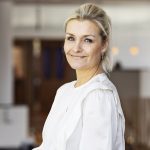More women than men drop out of a research career before it really takes off, and women get fewer major research grants than men. On International Women’s Day, Lene Oddershede, Professor and Senior Vice President, Natural and Technical Sciences, Novo Nordisk Foundation, provides insight into what many women researchers need to fight for – and what the Foundation is doing to support them.
According to the United Nations, women are awarded fewer large research grants, fellowships and scholarships than men. How do you perceive women’s opportunities to obtain research funding compared with men?
“Women’s and men’s theoretically have equal opportunities within each call for applications. However, there are two points of concern. First, the further up the academic career ladder, the fewer women submit an application. Second is whether unconscious bias may influence those who decide the grants.”
External expert committees often decide who receives the Foundation’s research grants. What do you do to reduce bias among them?
“For New Exploratory Research and Discovery (NERD), one of our programmes in open competition, we have decided to anonymise the grant applications in the first stage of the evaluation. The committees thus have no access to information on sex, age, bibliometric indicators or citations. They can only see the description of the research idea.”
Does this work?
“The statistics show that women have a higher success rate than usual in NERD. Further, NERD addresses another challenge: more women than men give up research or reduce their activity once they have children. NERD grants last 7 years, where other research grants typically last 3–4 years. This long time horizon of 7 years enables both women and men plenty of time to take parental leave and yet prove that they can carry out excellent and original research.”
What about the other research grants?
“Last year, we introduced partial randomisation for our project grants. The committee assesses which projects are worthy of support, and if these projects require more funds than those allocated, lots are drawn among these projects to avoid bias. This principle is being implemented as a pilot project for 3 years in five of our committees so that it is broadly established in the Foundation’s procedures.”
Do you use any other methods to promote the position of women in research?
“Yes, our RECRUIT and Start Package Grants recruitment programmes provide funding to enable universities in Denmark to recruit and offer a very attractive start package for the person they want to attract for a special role, such as ensuring diversity within a specific professional field.”
According to the United Nations, women researchers have a shorter research career on average than men. What do you think causes this?
“Women disappear from the system because they get other opportunities they consider more attractive than carrying out research. Staying in research is especially difficult for women at the age when they start having children. Working conditions and merit systems are often given as the reason why women leave research earlier than men.”
What can we learn from the universities that have actually been successful in attracting and retaining talented women as faculty members?
“Attracting and retaining top women researchers is generally easier for top universities such as Harvard or MIT where compensation and terms of employment are very favourable. The top universities in the United States typically make a great effort to recruit diversely by conducting a thorough search and offering attractive start packages and terms of employment. This makes the gender balance more equal, which affects the composition of the students, since they are often attracted by a principal investigator they can consider a role model, regardless of sex, ethnicity or other factors. Faculty members become role models for the next generation.”
Why are role models important here?
“Role models are incredibly important. If you can see a woman researcher who has done good work, has accomplished exciting things and is listened to – but also has a good work–life balance, then she can become an image showing you that you can also follow this path. Young people tend to become especially aware of this. They are more aware that they want to have a good and meaningful life. They also want to have children and leisure time once in a while – both women and men.”
Will the Foundation make gender equality in research an important theme in the future?
“Yes, we will continue to examine which instruments we can use to create equal opportunities for women and men in our grants. Although much is going in the right direction, there is still a long way to go before women and men are equal in most research fields within the natural and technical sciences. The Foundations’ most important criterion is that research must be of good quality. Research enables us to overcome the challenges of the future, and having a diverse research community and a creative approach to solving problems is extremely important for precisely this reason.”
On 8 March 2023, Lene Oddershede received the DANWISE 2023 award. DANWISE is a non-profit organization representing women from academia, industry and business spanning the fields of Science, Technology, Engineering, Mathematics and Medicine (STEMM) and Humanities.
About the Novo Nordisk Foundation
Established in Denmark in 1924, the Novo Nordisk Foundation is an enterprise foundation with philanthropic objectives. The vision of the Foundation is to improve people’s health and the sustainability of society and the planet. The Foundation’s mission is to progress research and innovation in the prevention and treatment of cardiometabolic and infectious diseases as well as to advance knowledge and solutions to support a green transformation of society.









